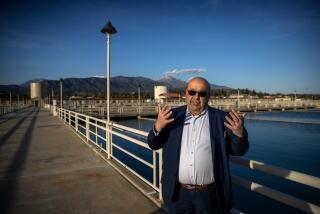Wildlife Official Who Raised Environmental Concerns Dismissed
Rolf Wallenstrom, director of the Pacific Region of the U.S. Fish and Wildlife Service who raised concerns about offshore oil drilling in California and agricultural pollution at western wildlife refuges, has been fired.
Calling himself the target of agency politics, Wallenstrom, 56, confirmed Tuesday that he has been fired effective Friday. He said he is considering an appeal to the federal Merit System Review Board or a lawsuit.
Department of Interior officials said Wallenstrom was terminated for refusing a transfer to a new post. Wallenstrom contended the job was created to isolate him from decision-making in several western states.
Wallenstrom, based in Portland, Ore., argued that he was the victim of a political vendetta by Fish and Wildlife Director Frank Dunkle. Dunkle, who is seeking reappointment, has rejected UPI requests for interviews on the Wallenstrom matter.
He issued a statement Tuesday expressing regret that a career employee “had chosen to leave the service under unfortunate circumstances.” He said Wallenstrom “tried to politicize an issue that had nothing to do with politics.”
Wallenstrom said a decision to appeal would be “influenced by whether Frank Dunkle is reappointed. If he leaves and I leave, then I will not appeal,” Wallenstrom said. “If he is maintained, and if I can afford it, I probably will appeal.”
Rep. Barbara Boxer (D-Greenbrae), who has tried to save Wallenstrom’s job, said she was “appalled” at his firing. “It was bad enough he was reassigned and now he’s been fired for trying to do an objective job,” Boxer said.
Boxer led a group of 20 members of Congress from four states who requested an investigation by the General Accounting Office in November into the Wallenstrom matter and other alleged efforts by Dunkle to politicize the agency. That investigation is under way.
The dispute began last summer after disclosure of an internal report that said oil drilling off the Northern California coast could have disastrous environmental consequences. President-elect Bush supported the oil drilling proposals until the report was leaked to the news media. Wallenstrom said Dunkle unfairly blamed him for leaking the memo.
Dunkle said he wanted Wallenstrom to take a newly created position to oversee investigations into pollution problems at the Kesterson National Wildlife Refuge in Central California and at other western wildlife refuges polluted by Interior Department irrigation projects.
Wallenstrom refused to take the position and Dunkle called for his ouster.
Susan Recce, the department’s deputy assistant secretary for fish and wildlife and parks, wrote a five-page letter to Wallenstrom last week upholding the firing.
More to Read
Sign up for Essential California
The most important California stories and recommendations in your inbox every morning.
You may occasionally receive promotional content from the Los Angeles Times.










